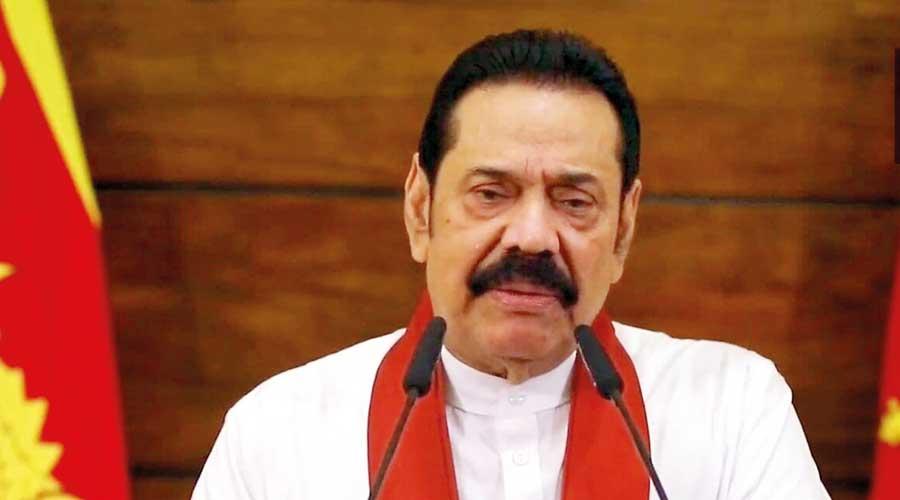15 May 2024 - {{hitsCtrl.values.hits}}

Mahinda Rajapaksa thrives in a sense of inviolability and a culture of impunity fostered by the very system that sustains their political existence.
Like the rest of his ilk in this part of the world, Mahinda Rajapaksa overstayed his welcome in the power. He ran the economy to the ground as he did with the national carrier, which he re- nationalized out of a fit of rage after its Emirates management refused to deplane fee-levying passengers to make room for his entourage.
nationalized out of a fit of rage after its Emirates management refused to deplane fee-levying passengers to make room for his entourage.
He tried on a dynastic power grab that went spectacularly wrong, ending in the worst-ever financial crisis since the independence.
But, like every crook and conman in Third World politics, Mahinda Rajapaksa thrives in a sense of inviolability and a culture of impunity fostered by the very system that sustains their political existence.
So last week, he was back, opposing the restructuring of the whoopingly loss-making state-owned enterprises, whose total loss in 2022 alone was Rs 744 billion (US$ 2.5 billion at the current exchange rate). Rajapaksa’s opposition to their divesture is a political manoeuvre, not for himself, but for the hair apparent political scion Namal.
Puppet master
Rajapaksa wants the government, of which he is a puppet master, to postpone the divesture of the SOEs until a new government is elected because of rising ‘discontent of discontent among trade unions, political parties and the general public.”
Third world’s crooks are thick-skinned and unapologetic. So is Rajapaksa. He goes on to brag that “in fact, my government re-acquired some state-owned enterprises such as the Insurance Corporation and Lanka Hospitals that had been sold off by previous government”.
What he did not say is that the national carrier SriLankan, which he took over and handed over to a sibling of his crony, is now destroyed beyond repair, incurring a loss of Rs 400 billion, and without a credible buyer, even after the government transferred US$ 500 million of its losses to the treasury.
In any other world, the pillage of national assets of this magnitude would have landed those responsible in jail.
Rajapaksa goes on to justify a strategic decision’ for the politically mandated pricing of fuel and electricity, which remained unchanged for nine years until the country grinded into a halt in fuel queues and regular power cuts, after the treasury ran out of all reserves, maintaining an unaffordable exchange rate to the dollar and burning through expensive fuel subsidies.
Rajapaksa’s ‘strategic’ thinking is one of petty-minded self-preservation. He did not even write that press release, one of his English-speaking acolytes did.
Rajapaksa’s ‘strategic’ thinking is one of petty-minded self-preservation. He did not even write that press release, one of his English-speaking acolytes did.
Rule of law
In countries where there is a semblance of the rule of law-, like in Thailand, where ex-prime minister Yingluck Shinawatra was sentenced to jail for a US$ multi-billion rice scandal in exchange for votes or in Brazil, where Dilma Rousef was barred from politics for cooking books- Rajapaksas should be defending themselves in courts for the self-inflicted destruction of the Sri Lankan economy. In extreme cases, like Nicolae Ceausescu’s Romania after the fall of Iron Corden, crooks would have been hung by the lamppost.
But, Sri Lanka fosters a culture of impunity for its politically powerful crooks, who relapse into cannibalizing the state at the earliest possible opportunity.
As the economy is recovering- which it is, no matter the usual nagging in the political stages- and the country is heading for an election, usual charlatans are now on the prowl again, looking for the gullible, dumb and equally entitled.
Rajapaksa’s missive is aimed at them. It is an act of self-preservation. The family is bigger than the country. So, the dynastic enterprise should go on. Willing suckers could be onboarded on the go. The man who ruins
SriLankan, CEB, and CPC and builds a long list of vestige projects does not give two hoots about the state of the economy. However, the preservation of the family, as usual, comes at the country’s expense. He would stall the slow recovery process so that, in the ensuing chaos, the family could have a shot at power.
Discord and contradiction
The Rajapaksa’s missive is designed to sow discord and contradiction in the government policy at its most vulnerable moment. The discord is intended to cause policy paralysis. True that his own acolytes are shunning Rajapaksa. The power and energy minister says the restructuring of the CEB would continue no matter what.
His opposition raises concerns over the government’s adherence to the IMF program for microeconomic stability and debt sustainability when investors, debtors and international partners seek clarity and consistency.
Rajapaksas have thrived on chaos, instigating the public against every economic reform effort. That they put up with Ranil Wickremesinghe’s reform agenda, despite being the puppet masters of his government, was due to the far more immediate concerns of self-preservation. Without Wickremesinghe’s presidency, Rajapaksa’s political survival would have been exceedingly gloomy.
Yet now, physical survival seems to be guaranteed, and Rajapaksa moves on to the political perpetuation and dynastic end game.
For that to succeed, Wickremesinghe’s reform agenda should be defeated. It is a ploy to take control back to the family from Wickremesinghe, with whom power was vested temporarily until the family is sufficiently secure from the wrath of the grassroots.
Just like the power was vested with the Gotabaya Rajapaksa until Namal was ready to take the throne.
There is no gainsaying that Wickremesinghe has failed to hold the Rajapaksas accountable for the self- inflicted depredation of the country. But, if he fails to save the do-or-die reform agenda of the government from the Rajapaksa’s dynastic scheming, history would not be kind to him.
24 Nov 2024 6 hours ago
24 Nov 2024 9 hours ago
24 Nov 2024 24 Nov 2024
24 Nov 2024 24 Nov 2024